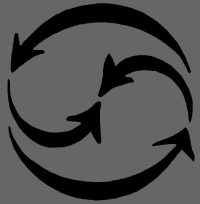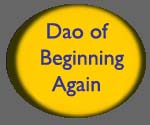"The Way is beyond the power of words to
define.
Words come to mind, but they do not express it truly.
"In the beginning was No Word.
Words issued profligate, from the womb of matter.
"And whether, in passion, we resonate with the surface of
things or in wisdom we penetrate to the core...
"Yet the surface and the core are essentially One -
The concept makes them seem distinct, manifesting different surfaces.
"If you ask me then I will name this "Wonder".
"From Wonder into Wonder, existence emerges forth."
See also: The Dao, considered in
present-day contexts
We will say that Jesus was a super-shaman who
claimed he had a direct line on the path to the Good; and he was
willing to die on the cross in order that humanity might be saved from
its bondage to sin.
We will also notice these symbols: the Man nailed to the
Cross; and Christ raised up as the flesh and blood member of the Holy
Trinity, which is the triangle of forces made up of the Lord, the Holy
Spirit and the Son.
These symbols stand as images of the Way of Christ. That is: a
path that stands aloof from all the set codes of morality or convention
which people may try to impose; a path which cuts underneath all
personal struggles for power and privilege; a path whose truth can
never be alloyed with any form of pretension or insincerity - and which
is the only path which leads to real fulfillment.
Where are we now?
And so we, as the present-time inheritors of
the Christian vision, have burned into the deepest levels of our minds
this vision of a path for every human being. This path, threading an
unbroken way towards the Good in spite of all the temptations,
intimidations and calamities that may try to block it. And in this
vision the only real source of failure is the weakness or the misguided
willfullness of the individuals themselves.
Now we surely live in times of extreme confusion, where the
path to the Good seems to have merged invisibly with the snares and
delusions of the surrounding scenery. Yet we, brought up within a
Christian culture, speaking a Christian language, cannot help but feel
that we are either on the path or off it; we are
either saved or lost - even if we don't know how to distinguish which
is which.
No way out of this
All of us are caught in this: Christians,
apostates, atheists, post-modernists, Marxists and dilettante
relativists: all of us are trying to convince ourselves that we are on
the path, or we are anxious that we may have lost it. This is
especially likely when we are busy denying there ever was a path in the
first place. Often the disguise is thin indeed, for instance with the
Marxist creed which is really nothing else than the same old Christian
struggle to build the Kingdom of Heaven on earth, under new management
and a different name.
Fundamentalists all around
So it is interesting how the same old sins keep
cropping up under new disguises. And the same fundamentalist idiots
arguing about the True Creed and trying to force it down everyone
else's throats. And the same arrogance, intolerance and inhumanity
practised under the false banner of Socialism or Nationalism - just as
we have seen under the false banner of Christianity from the time when
the Holy Fathers first got turned on to the blood lust. "Plus ca
change, plus c'est la meme chose", as my old Creole granny used to say
to me as we sat together under the twilight shadow of the guillotine.
adapted from "A Bolt From the Bleeding Sky"
by Michael Roth, published 1984
Let us first consider the astonishing words
with which Martin Buber began his most influential work I and Thou(1923):-
"To man the world is twofold, in accordance with his twofold
attitude.
"The attitude of man is twofold, in accordance with the
twofold nature of the primary words which he speaks.
"The primary words are not isolated words, but combined words.
"The one primary word is the combination I-Thou,
"The other primary word is the combination I-It;
wherein, without a change in the primary word, one of the words He
and She can replace It.
"Hence the I of man is also twofold.
"For the I of the primary word I-Thou is a
different I from that of the primary word I-It."
 |
| * * * |
 |
"Primary words do not signify things, but they intimate relations.
"Primary words do not describe something that might exist
independently of them, but being spoken they bring about existence.
"Primary words are spoken from the being.
"If Thou is said, the I of the combination
I-Thou is said along with it.
"If It is said, the I of the combination
is said along with it.
"The primary word can only be spoken with the whole being.
"The primary word I-It can never be spoken with the
whole being."
Orienting our search
I believe that in this short passage there are
some vital clues for successfully orienting our search for The Way.
First I want to emphasise that Buber never suggested that we should
prefer the I-Thou attitude over the I-It in any
absolute sense. It is rather that the dimension of I-Thou has
an indispensible part to play in our life, that is too easily
overlooked. Only if we take our bearings from the I-Thou, can
we maintain and integrate our stance amidst the complex, conflicting
demands of the world we live in.
The danger, and the tragedy
Obviously there is a whole book to hand, in
which Buber is going to explore the complex interplay between our two
fundamental attitudes. There was also more than half a lifetime, in
which he would further unfold this complex vision, in writing and
teaching, and in living. I, however, am simply wanting to summarise
here one essential point, about these two fundamental human stances:-
The I-It exists in a relation of spontaneous interplay with
the I-Thou, and this is a natural part of our being human.
Then Buber is trying to point out to us the danger which comes from our
out-of-control expansion and the every increasing complexity which we
are generating in the realm of "I-It". This is our modern
tragedy: we have become lost in the tangles of "I-It", and we
cannot find our way home.
Our search
This is one way of defining the search we are
committing ourselves to, in the Dao of Beginning Again. We will avoid
the simplistic interpretation of Buber which would make an Idol out of
the concept of the I-Thou, but we are searching for ways to
increase the influence in our lives, of this mode of relationship to
What Is. This entails learning better to navigate the realms of I-It,
which is not at all the same thing as repudiating it, or trying to
diminish its importance. We are seeking a new integration of these two
modes of our being: this is the search that we are committed to, and
which we have barely yet begun.
© all content: copyright reserved,
Michael Roth, March 2009
|







